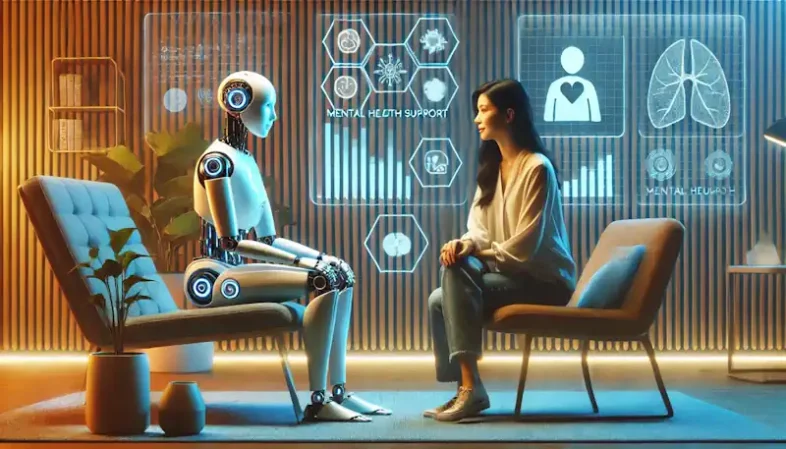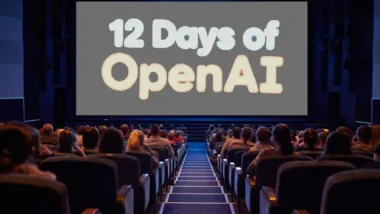Artificial intelligence (AI) is transforming the landscape of mental health care, offering innovative tools for early detection and intervention. As mental health issues continue to rise globally, AI technologies are stepping in to provide timely support and potentially save lives.
Table of Contents
The Rise of AI in Mental Health
AI’s role in mental health care is expanding rapidly, driven by the urgent need for accessible and effective mental health services. Researchers and tech companies are leveraging machine learning algorithms to analyze vast amounts of data, including speech patterns, social media activity, and physiological signals, to identify early signs of mental health issues such as depression, anxiety, and bipolar disorder.
Early Detection and Intervention
One of the most promising applications of AI in mental health is its ability to detect subtle changes in behavior and mood that may indicate the onset of mental health conditions. For instance, AI models can analyze how a person’s speech patterns change over time, identifying markers of depression or anxiety long before they become apparent to human observers. This capability allows for earlier intervention, which is crucial in preventing the escalation of mental health issues.
AI-Powered Tools and Platforms
Several AI-powered platforms are already making waves in the mental health sector. These tools offer a range of services, from mood tracking and cognitive behavioral therapy exercises to virtual counseling sessions. By providing users with real-time feedback and support, these platforms empower individuals to take control of their mental well-being.
Privacy and Ethical Considerations
While the potential benefits of AI in mental health are immense, they also raise important ethical and privacy concerns. The sensitive nature of mental health data necessitates stringent safeguards to protect user privacy. Experts emphasize the importance of developing transparent AI systems that prioritize user consent and data security.
Real-World Applications of AI in Mental Health
AI is making significant contributions to mental health care through various innovative applications. Here are some real-world examples of how AI is improving mental health:
1. Woebot
Woebot is an AI-powered chatbot designed to provide mental health support through natural language processing. It engages users in conversations to help them manage their mental health by offering cognitive behavioral therapy (CBT) techniques. Woebot can track users’ moods, provide psychoeducation, and suggest coping strategies, making mental health support more accessible and immediate.

2. Wysa
Wysa is another AI-driven chatbot that offers mental health support. It uses evidence-based therapeutic techniques, such as CBT, dialectical behavior therapy (DBT), and mindfulness, to assist users in managing stress, anxiety, and depression. Wysa is designed to be a confidential and judgment-free space for users to express their feelings and receive guidance.
3. Ginger
Ginger provides on-demand mental health support through a combination of AI and human expertise. Its platform offers chat-based coaching, therapy, and psychiatry services. AI is used to analyze user interactions and provide personalized content and recommendations, enhancing the overall effectiveness of the mental health support provided.
4. Ellie, the Virtual Therapist
Developed by the University of Southern California’s Institute for Creative Technologies, Ellie is a virtual therapist designed to assess mental health through conversation. Ellie uses AI to analyze verbal and non-verbal cues, such as facial expressions and voice tone, to evaluate a person’s mental state. This technology is being explored for use in clinical settings to support mental health assessments.
5. Replika
Replika is an AI chatbot that serves as a virtual companion, designed to engage users in meaningful conversations. While not specifically a mental health tool, many users find Replika helpful for managing loneliness and stress. The AI learns from interactions to provide more personalized and supportive responses over time. These examples demonstrate how AI is being integrated into mental health care to provide scalable, accessible, and personalized support. By leveraging AI technologies, these tools aim to bridge gaps in traditional mental health services, offering innovative solutions to meet the growing demand for mental health care.
The Future of Mental Health Care
As AI technologies continue to evolve, their integration into mental health care is expected to deepen. Future advancements may include more sophisticated predictive models and personalized treatment plans tailored to individual needs. This could revolutionize how mental health services are delivered, making them more accessible and effective for people worldwide.
The use of AI in mental health care represents a significant shift towards more proactive and personalized approaches to mental health management. By harnessing the power of AI, healthcare providers can offer timely support and intervention, potentially improving outcomes for millions of people. As this technology matures, it holds the promise of transforming mental health care into a more responsive and effective field, ultimately enhancing the quality of life for those affected by mental health issues.


